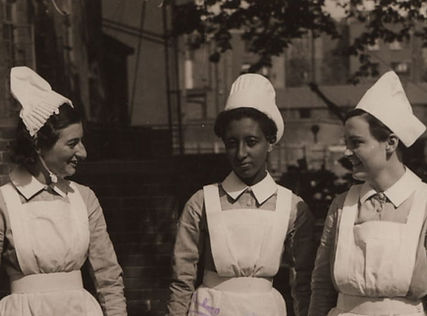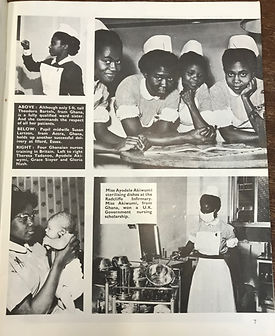
PRE-1930
9 July 1832
British Medical Association (BMA) founded in Worcester as an organisation for
doctors.
1858
Medical Act introduced to formally regulate who could legally practice medicine and establish the General Medical Council
1911
National Insurance Act
1916
Royal College of Nursing (a membership organisation and trade union) founded on 27th March with 34 members
1919
Nurses Registration Act establishes a register for nurses for the first time after campaigning from the Royal College of Nursing
November 1923
CONGO - Lulu Coote (1890-1964), the daughter of a Congolese woman and a Belgium sailor, registers as a nurse after training in Ashton under Lyne from 1911-1913
1925
West African Students Union (WASU) founded by
Ladipo Solanke and Herbert Bankole-Bright in London
1929
NIGERIA - Agnes Yewande Savage (1906 - 1964) becomes the first African woman to receive a medical qualification in Britain. She received a first class degree from the University of Edinburgh


.png)


1940
1940
British Association of Dental Nurses, originally known as British Dental Nurses and Assistants Society is founded
The state enrolled nurse is formally recognised with two years of training
1941
NIGERIA - Nurse Adenrele Ademola (2 Jan 1916-) receives training as a midwife at Guys Hospital during the Second World War
1942
BBC recording with Nurse Ademola
1943
Nurse Ademola film is produced by the Colonial Film Unit
1944
SIERRA LEONE - Sierra Leone’s first female doctor, Dr. Irene Ighodaro (1916-) qualifies in medicine from Durham University
1945
5th Pan African Congress held in Manchester - link between the anti-colonial struggle and trade unionism was strengthened by the involvement of many trade union delegates
1946
West African Women’s Association formed with Dr. Irene Ighodaro as a co-founder
1947
GHANA - Susan Ofori-Atta (1917- becomes the first Ghanaian woman to graduate in medicine from the University of Edinburgh
1948
Formation of the National Health Service (NHS)
Sentiments of the colour bar were reflected in hospitals. The matron at St Benedict’s Hospital, Tooting imposes a ban on coloured guests attending the nurses dance. Clara Brown an assistant nurse working, presumed to be of Jamaican descent was the only ‘coloured’ nurse at the hospital at the time.
British Nationality Act - gives all Commonwealth citizens the right to live and work in Britain
1949
The health and labour ministries begin recruitment campaigns in attempts to restore a war-torn Britain
Matilda Clerk first woman from the Gold Coast, or West Africa in general, to receive post graduate diploma from London School of Hygiene and Tropical science

_tif.png)

1930
1935
Susan Ofori-Atta graduates from Kole-bu Midwifery Training School
1938
NIGERIA - Elizabeth Abimbola Awoliyi (1910-1971) becomes the first West African woman to earn a license from the Royal Society of Medicine - from the Royal College of Surgeons in Dublin*
1939
ETHIOPIA - Princess Tsahaitu Selassie (13 October 1919 -17th August 1942) , daughter of Ethiopian Emperor Haile Selassie, graduates as a state registered nurse in London
*Although as she studied in Ireland and therefore not in the scope of our project we felt it was important to other researchers to have her name and accolades available to all.
.jpg)
-1_.jpg)


1950
1950
NIGERIA - The ‘African Florence Nightingale’ Kofoworola Abeni Pratt qualifies as a state-registered nurse, and is often cited as the first qualified black nurse in the NHS but in fact amongst the first
1951
Male nurses joined the main nursing register. Although in prior registers men had formed part of the Supplementary Register, following the 1949 Nurses Act, this was abolished
1953
NIGERIA - Dolupo Ransome Kuti graduates from Gracefield’s nursing school at Rushgate
1955
SUDAN - Miss Howa Salih Kabashi becomes the first Sudanese woman to come to the United Kingdom on a British Council bursary
Colonial Office introduced a new policy encouraging married (male) students who planned to spend more than nine months studying in Britain, to bring their wives with them to the UK.
1956
The first nursing studies unit in the UK is established at the University of Edinburgh
1957
Nurses Agencies Act established
to consolidate certain enactments relating to
agencies for the supply of nurses
1958
Adenike Grange, former Nigerian Minister in charge of the Federal Ministry of Health, begins her medicine degree at the University of St Andrews. In 1967 she became senior house officer (paediatrics) at the St Mary's Hospital for children, and obtained a Diploma in Child Health in 1969.


1960
1960
RCN Membership open to all registered nurses including men
Edna Adan Ismail, the first Somali woman to study in the UK, and the first to work as a qualified nurse, graduates as an State Registered Nurse
Ghana Registered Nurses Association (GRNA) was formed, founded by Docia Kisseih
There were 11,000 Africans in Britain as ‘recognized students’ plus tens of thousands of ‘private students’ (those who had come without government funded scholarships)
1962
Commonwealth Immigrants Act - restrictions - specified that those not born in the UK and not holding a British passport were subject to immigration control
(Exceptions to immigration controls were made for essential and well-qualified staff, hence both nurses and doctors were exempt from the immigration controls imposed in the 1960s)
1965
NIGERIA - Dolupo Ransome Kuti obtains a diploma in nursing administration from Halifax Hospital, Rochdale
1966
Cogwheel Report considers the organisation of doctors in hospitals and proposes speciality groupings. This allowed for specialisations for “Black” issues like Sickle Cell.
Asquith Xavier, a West Indian transport worker, successfully challenges the colour bar.
1967
The Salmon Report is released - it made recommendations aimed at raising the status of senior nurses within hospital management
1968
Commonwealth Immigrants Act - more restrictions - required certain migrants to supply proof that either they, their parents or grandparents had been born in Britain
Race Relations Act makes it illegal to refuse housing, employment, or public services to a person on the grounds of colour, race, ethnic or national origins in Great Britain
Enoch Powell’s ‘Rivers of Blood’ Speech - criticises Commonwealth immigration to the UK
Sister Patricia Veal lead a march of 1000 nurses to Downing Street for equal pay
Children's Departments had (successfully) urged a reversal of the Colonial Office’s policy on married students
_JPG.jpg)


1970
1976
New Race Relations Act passed made it unlawful to discriminate on grounds of race, colour, nationality (including citizenship), and national or ethnic origin. The Act covers employment, education, training, housing, and the provision of goods, facilities and services.
1977
GHANA - Former athlete Rose Amankwaah, once crowned the "fastest woman in Africa", appointed as theatre matron in Central Middlesex Hospital
1979
Nurses, Midwives and Health Visitors Act to make new provision with respect to the education, training, regulation and discipline of nurses, midwives and health visitors and the maintenance of a single professional register
NIGERIA - Elizabeth Nneka Anionwu (2nd July 1947 - present) becomes the UK's first sickle cell and thalassemia nurse specialist, forming The Sickle Cell Society which was set up as a registered charity
Kofoworola Abeni Pratt awarded Honorary Fellowship of the Royal College of Nursing FRCN(hon)


1980
1981
British Nationality Act - reclassified Citizenship of the United Kingdom and Colonies (CUKC) into three categories: British citizenship, British Dependent Territories citizenship (BDTC); and British Overseas citizenship
Migration rates of African migrants increases, which becomes reflected in the increase in number of registered nurses of African descent
1983
Work permits for nurses were abolished prohibiting further entry of overseas nurses to train in Britain. A report for the Commission of Racial Equality, published that same year, found a higher proportion of trained overseas-born nurses, than overseas-born nurses in training. It also stated that less than 9 per cent of nurses employed by the NHS were born in developing countries.
1987
NIGERIA - Janet Adegoke a Nigerian-born nurse elected mayor of Hammersmith and Fulham in 1987, becoming the UK’s first black African woman mayor
.jpg)
1990

1990
Project 2000 introduced - designed to move nursing education from hospitals to universities
Key proposals were a new registered practioner, a two year common foundation course followed by one year's specialisation, an end to enrolled nurse training, and an end to dependence of the hospital service on student labour.
1993
The Ghana Nurses Association UK is formed by five nurses in London. The primary aims of the Association is to foster unity, friendship and support to individual members faced with life cycle events and to contribute to healthcare/education in Ghana, share knowledge and expertise with each other, donate to charitable causes in the UK and maintain close relationship with other Black & Ethnic Minority Nurses Associations.
1997
Nurses, Midwives and Health Visitors Act established to consolidate 1979 act
1998
Nigerian Nurses Charitable Association UK is formed in January. Its mission is to provide a forum for collective action by Nigerian nurses to "investigate, define and determine issues affecting its members with a view to implement change to alleviate and improve living and working standards amongst members"

2001
Nursing and Midwifery Order to establish and maintain a register of all qualified nurses and midwives eligible to practise in the UK
2002
Nursing and Midwifery Council, regulator for nursing and midwifery professions in the UK, is founded
2009
Announcement that nursing courses in UK become degree level from 2013, standards developed by NMC
2014
Ghana-born sexual health nurse Cecilia Anim elected as Royal College of Nursing’s first black president
2015
Workforce Race Equality Standard (WRES) first introduced
2020
The World Health Organization (WHO) designates 2020 as the “Year of the Nurse and Midwife”, in honour of the 200th birth anniversary of Florence Nightingale
COVID-19 global pandemic sees NHS workers on the frontline in fight against the disease. African women were among many of the NHS staff who died amid the health crisis. Report also published on disproportionate number of people from ‘BAME’ backgrounds affected by Covid-19.
2000s
_edited.jpg)



